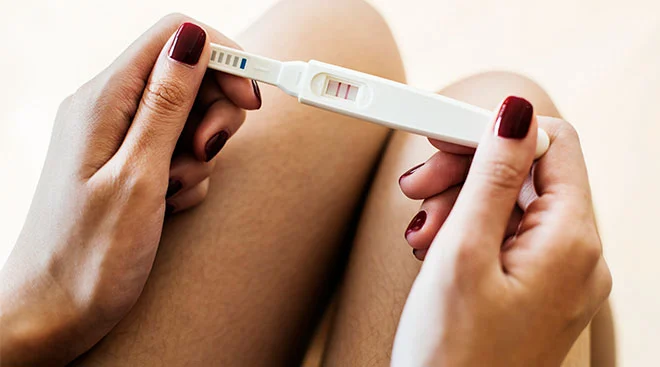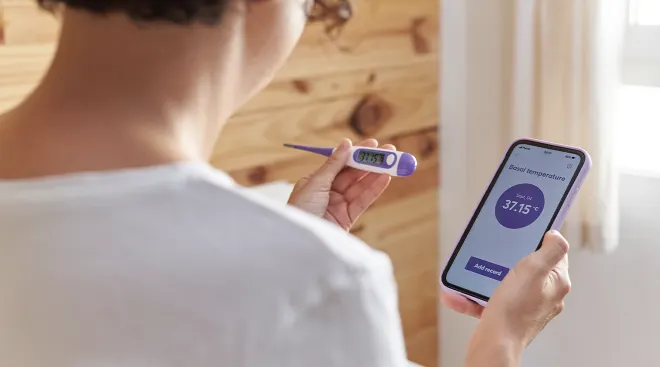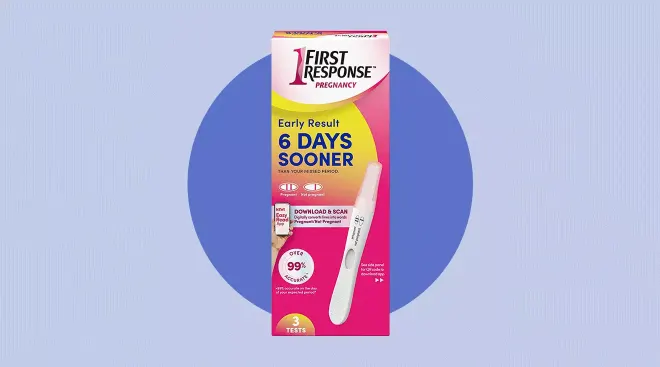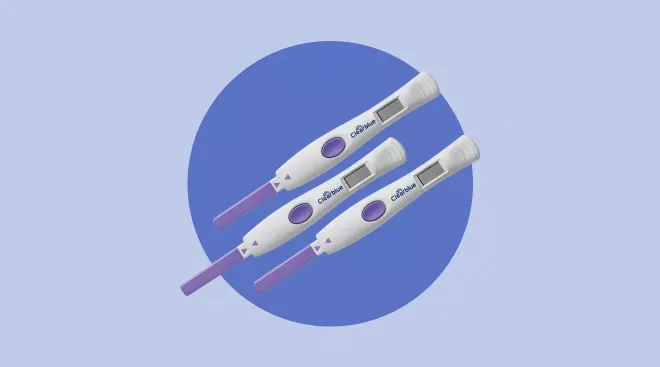When to Take a Pregnancy Test: the Best Timing for Accurate Results
Think you might be pregnant? Taking a pregnancy test is an obvious way to find out if you’re expecting—but when is the best time to take a pregnancy test? You’re looking to find out if your life is about to completely change, so it’s understandable to want to know as soon as possible. Gaining a better understanding of how today’s tests work will boost your chances of getting an accurate reading. Here’s what experts say about when to take a pregnancy test and what is the earliest you can take one and still get a reliable result.
Two types of pregnancy tests are at your disposal: blood and urine. You can get blood and urine tests at your doctor’s office, a lab or a clinic, or you can take a urine pregnancy test right in your own bathroom. Both blood and urine pregnancy tests search for the presence of human chorionic gonadotropin (hCG), a hormone that the placenta releases only once an embryo has implanted in your uterus (aka, when you’re pregnant).
Urine tests measure hCG levels in your urine, which rise rapidly during the first few weeks of pregnancy, typically doubling every 48 hours. It continues to rise the longer you’re pregnant, making it easier for the test to spot the hormone with every passing week. How early hCG can be detected in urine depends on the pregnancy test, as some are more sensitive than others. The amount of hCG in a urine sample can also depend on how much fluid you drink or how often you urinate. Typically, light or clear urine—while a sign of good hydration—is less concentrated and may not give a clear result on a home pregnancy test. Darker urine (typically what you have first thing in the morning, before you’ve downed any liquids) may lead to a more distinguishable reading.
At-home urine tests are, of course, a convenient option if you have an inkling you’re pregnant. They’re available for as little as a few dollars at your local grocery or drug store, and you can choose from a digital or analog version.
Digital tests tend to be more expensive, but they’re not necessarily more accurate. They will, however, give you a direct answer, showing a written result of “pregnant” or “not pregnant” as opposed to, say, the lines or color changes that might leave you second-guessing what you’re seeing.
Analogue pregnancy tests typically provide an answer with a plus or minus sign, a change in color or a series of bands, depending on the brand. If you’re actively trying to conceive (and therefore testing frequently), this style is the most affordable option. Some come as packets of individually sealed strips that you immerse into your collected urine, while others are designed with plastic holders that you can insert directly into your urine stream. Depending on the test, you then simply wait for the reading to appear on the strip or screen—usually for one to five minutes. (We know you can’t wait, but resist the urge to check before it’s time! It’ll compromise the results.)
Whichever at-home pregnancy test you decide to use, check the expiration date before buying. Read the instructions and follow them exactly—they’ll tell you when to take a pregnancy test (early pregnancy tests can let you check days earlier), how long to wait before checking the results and how to interpret them to learn whether or not you’re expecting.
Blood pregnancy tests
Blood pregnancy tests take place in a doctor’s office or clinic, where a blood sample is drawn from your arm. This can be done a few days earlier than a urine test because these tests are more sensitive at detecting hCG levels. While some blood tests are qualitative (they simply tell you whether or not you’re pregnant), you’re much more likely to undergo a quantitative blood test, which measures the exact amount of hCG in your blood, even at trace levels. That way it can provide insight into the pregnancy’s viability and track hCG levels over time to make sure they’re rising appropriately, says Rashmi Kudesia, MD, an ob-gyn and fertility specialist with SimpleHealth and author of Understanding Fertility Awareness Methods: Gaining Control of Your Fertility.
When you wait until the right time to test, you up your test result’s accuracy dramatically—so pay close attention to the instructions for when to take a pregnancy test. Some home pregnancy tests say they’re on the mark as early as the first day you’ve missed your period. Other early pregnancy tests claim to be accurate even before that, at five days before your expected period.
Generally speaking, waiting until after the first day of your missed period—about two weeks after conception—leads to a more accurate reading. That’s because after a fertilized egg implants, the placenta forms and produces hCG. That hCG enters your urine and bloodstream and increases over time.
If you take a home pregnancy test too early, it may have difficulty detecting what little hCG has been produced. But blood tests can pick up hCG a few days earlier in a pregnancy than urine tests—just one day after implantation. “It’s that quick,” says G. Thomas Ruiz, MD, ob-gyn lead at MemorialCare Orange Coast Medical Center in Fountain Valley, California.
Very accurate. If you tested positive with an at-home urine test, it’s most likely correct, since, as we mentioned, pregnancy tests measure hCG, and you likely wouldn’t have the hormone in your body if you weren’t pregnant. In fact, urine tests are continually improving and can sometimes show faint lines that darken with time in a healthy pregnancy, says Kudesia.
False positives
False positives, where you’re not actually pregnant, are rare with at-home tests. HCG may show up in your urine if you miscarried, recently had an abortion or have taken medication with hCG (such as fertility or weight-loss drugs). If you’re testing before you’ve missed a period, the test may have picked up a chemical pregnancy, which happens when a fertilized egg implants and the placenta produces hCG, but then the egg stops developing. In this case, you’ll eventually get your period in a few days. Menopause and ovarian issues might lead to incorrect test results too.
Urine tests can also show false positive tests for women testing at the wrong time of their cycle or those with irregular cycles, says Kudesia. For example, if you test around the time of ovulation, your test could falsely show up as a positive, since hCG and LH (luteinizing hormone, the hormone that stimulates ovulation) are chemically similar.
Certain medical issues such as renal failure, rheumatoid factors and some types of cancer can cause false positives too.
False negatives
False negatives are also possible—meaning, you’re pregnant, but the test says you’re not. To avoid this, “wait until the hCG value is high enough to be detectable on a test,” says infertility specialist Armando Hernandez-Rey, MD, medical director at Conceptions Florida in Coral Gables and Miramar. That means carefully reading the instructions to know when to take a pregnancy test (as we noted earlier, some home pregnancy tests are less sensitive than others), resisting the urge to peek at the reading too early and avoiding drinking too much water before testing.
With a blood test—which are even more reliable than urine tests—you can (but rarely) get a false negative. This might happen if you take the test too early or if you happen to be taking a medication with hCG (such as fertility treatments).
The best time in your cycle to take a pregnancy test is after you realize that your period is late. This way, “you’re more likely to have high enough hCG levels to be picked up by the test,” says Kelly Culwell (aka Dr. Lady Doctor), MD, an ob-gyn. If you have irregular cycles or don’t know how long your cycles are, take a test after you’ve passed the longest menstrual cycle you usually have. So if your cycle ranges from 30 to 35 days, take the test on day 36 or later.
You can also take the test two weeks after you ovulate. If you’re actively trying to get pregnant, you’re likely using a variety of fertility awareness methods, says Kudesia. Methods include tracking cervical mucus, taking your basal body temperature and monitoring it, or using ovulation predictor kits.
The time of day that you take a pregnancy test plays a role in the accuracy of your results too. Your first morning urine is the ideal time to take a pregnancy test, Ruiz says, since this is when hCG is most concentrated. When your urine is more concentrated, the hCG levels are slightly higher.
Of course, you can take a pregnancy test at any time—these tests are sensitive no matter what the clock reads. As Kudesia explains, if you already have considerable levels of hCG in your body, it will show up positive regardless of what time of day you take the test.
When to take a blood pregnancy test
Blood tests are typically performed for higher-risk pregnancies, during fertility treatment or if you have a negative urine test but haven’t gotten your period. Doctors may also administer blood tests if you’ve possibly had an ectopic or tubal pregnancy or may have had a miscarriage. They’re also helpful when you aren’t sure of the date of your last menstrual period, have had recurrent miscarriages and want early pregnancy monitoring or are having trouble reading your home test results, says Kudesia.
If you missed a period and have a positive urine pregnancy test but have spotting, you may need a blood test. “We want to feel more confident that the bleeding isn’t a problem,” Ruiz says.
Some women also just need the peace of mind that they feel comes with blood pregnancy tests. “I’ve had patients who find testing at home traumatic, especially after long bouts of infertility,” Kudesia says. “So they always prefer blood tests.”
A missed period is a common reason—but that’s certainly not the only one. Here are common signs it’s time to take a pregnancy test:
• Your flow is unusually light or short compared to your usual flow.
• You’ve skipped your period altogether (if you have regular cycles) or you’ve missed three consecutive periods (if you have irregular cycles), says Ruiz.
• You’ve had contraceptive failure, like a broken condom, or you missed more than two birth control pills and don’t double up as suggested. Remember, a positive result won’t show up until about two weeks after you’ve had sex, says Kudesia—and only if you happened to have sex during your fertile window, which is five days before ovulation and the day you ovulate.
• You have light pink or brown spotting about a week before your period is due. This could be implantation bleeding, an early sign of pregnancy. It’s easy to confuse this irregular bleeding with the start of your period. “The most common cause of abnormal uterine bleeding in a woman of childbearing age is pregnancy,” Ruiz says.
• You’re feeling extreme fatigue, breast tenderness, sensitivity to smells or mild cramps. These could be early pregnancy symptoms, says Andrea Syrtash, founder of pregnantish, a site focused on helping people navigate infertility. She notes, though, that these are also possible side effects of fertility treatments. “In these cases, it’s good to do both an at-home test if you want to test early (which is always tempting!) and a blood test at the clinic or the lab."
• You just don’t feel like yourself or you feel different. “Women know their bodies better than anyone else,” says Hernandez-Rey.
For more telltale signs of early pregnancy, check out this post.
Please note: The Bump and the materials and information it contains are not intended to, and do not constitute, medical or other health advice or diagnosis and should not be used as such. You should always consult with a qualified physician or health professional about your specific circumstances.
Plus, more from The Bump:
Kelly Culwell, MD, is an ob-gyn known as Dr. Lady Doctor, and has specialized in women’s health for over 15 years. She was previously the senior medical advisor for the International Planned Parenthood Federation and served as a medical officer with the World Health Organization.
Armando Hernandez-Rey, MD, is a reproductive endocrinology and infertility specialist and serves as the medical director at Conceptions Florida in Coral Gables and Miramar. He also serves as an assistant clinical professor at the Herbert Wertheim College of Medicine at Florida International University. He received his medical degree from Universidad de Ciencias Médicas in San José, Costa Rica.
Rashmi Kudesia, MD, is an ob-gyn and fertility specialist with SimpleHealth, an online birth control consultancy. She practices at CCRM Fertility Houston, where she also serves as director of patient education. Additionally, Kudesia is the author of Understanding Fertility Awareness Methods: Gaining Control of Your Fertility(https://www.amazon.com/Understanding-Fertility-Awareness-Methods-Gaining/dp/1647393566?&linkCode=ll1&tag=tb-when-to-take-a-pregnancy-test-20&linkId=817746580155270433b8fc9db4e62df4&language=en_US&ref=asli_ss_tl). She earned her medical degree from Duke University School of Medicine and completed her residency in obstetrics and gynecology at New York Hospital-Weill Cornell Medical College in New York City.
G. Thomas Ruiz, MD, is the lead ob-gyn at MemorialCare Orange Coast Medical Center in Fountain Valley, California. He earned his medical degree from UC Irvine School of Medicine and has been practicing medicine in Orange County since 1993.
Andrea Syrtash is the founder and editor-in-chief of pregnantish.com, a website focused on helping people navigate infertility.
Learn how we ensure the accuracy of our content through our editorial and medical review process.
Navigate forward to interact with the calendar and select a date. Press the question mark key to get the keyboard shortcuts for changing dates.




















































